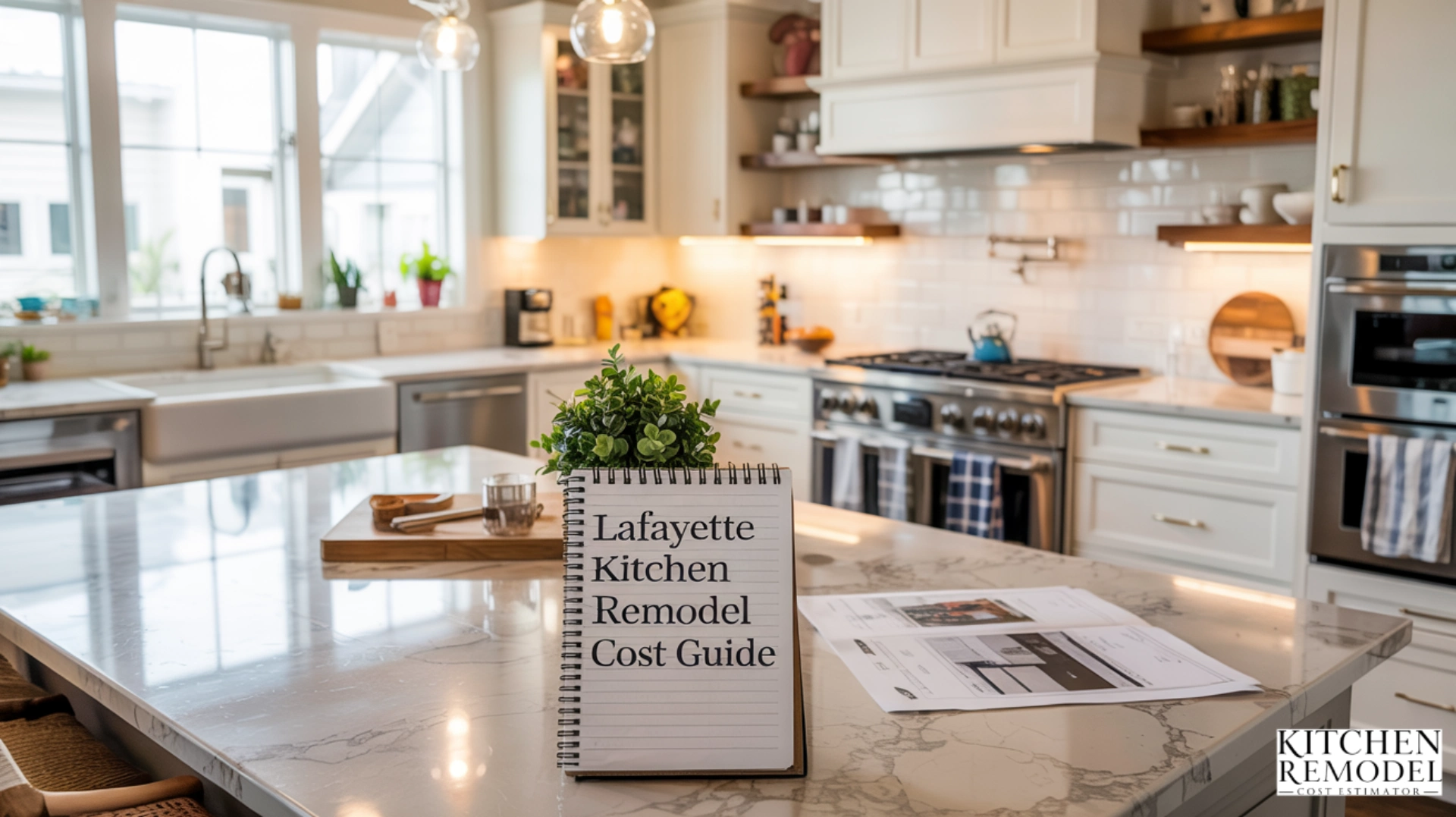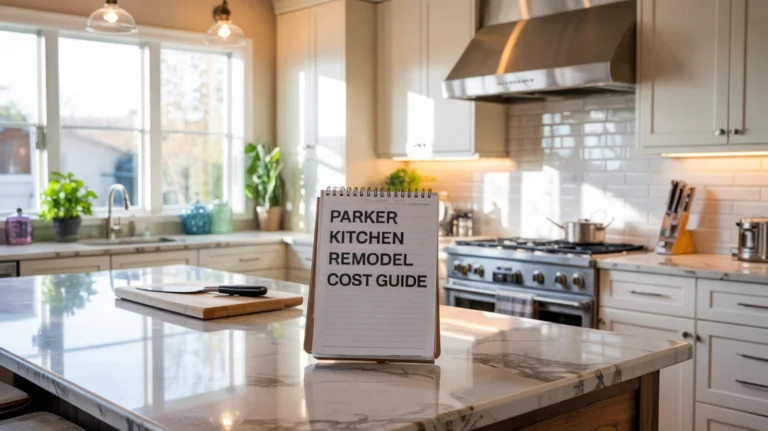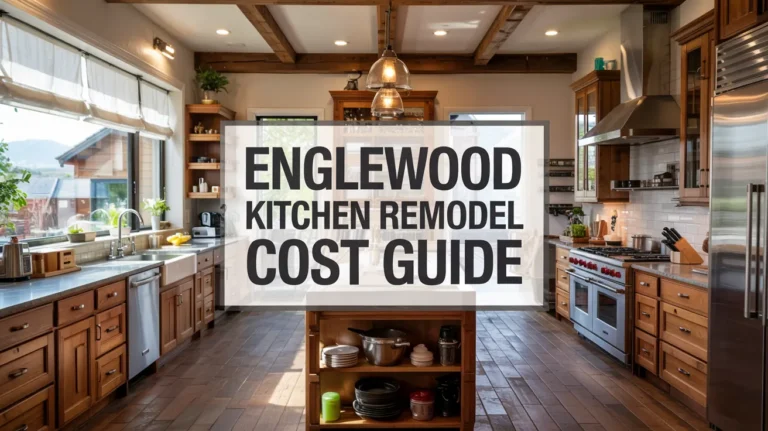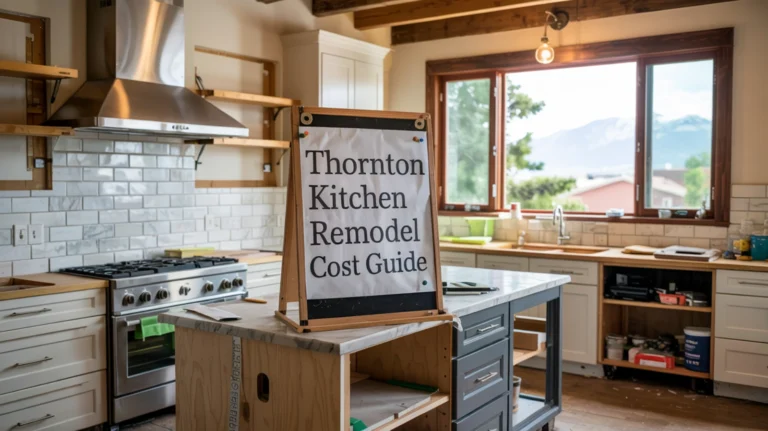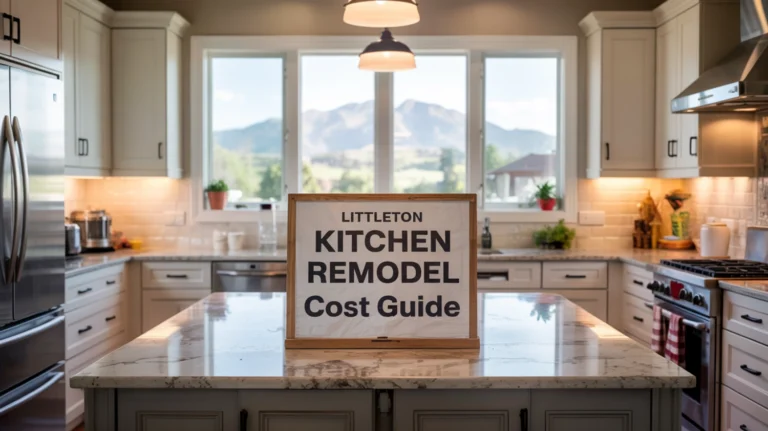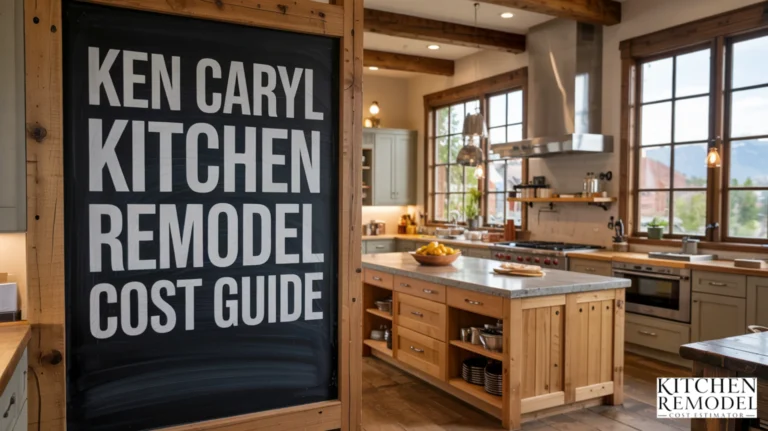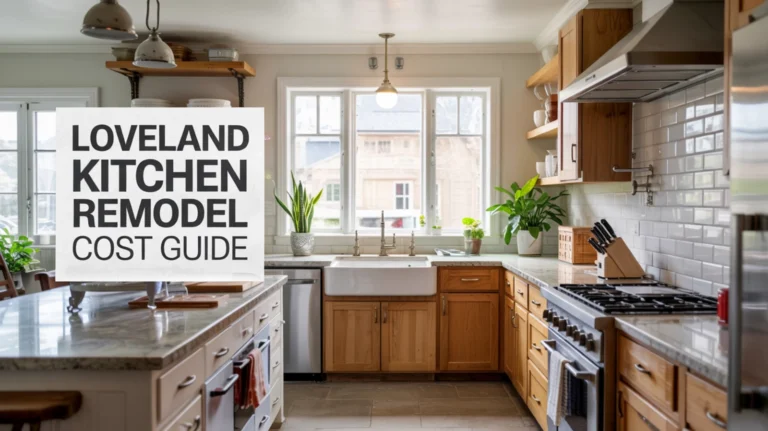In Lafayette, where mountain practicality meets Front Range aspirations, kitchen renovations reflect our unique position between Boulder’s design ambition and suburban sensibility. Our microclimate of remodeling costs operates on its own terms—influenced by both regional material availability and the particular tastes of a community that values quality without unnecessary extravagance.
So what exactly should you budget for a kitchen transformation in Lafayette?
The average kitchen remodel cost in Lafayette, Colorado ranges from $22,000 to $65,000. Minor remodels may cost around $12,000, while high-end renovations with premium finishes can exceed $80,000. Final cost depends on project scope, finish quality, appliance upgrades, and contractor rates in the area.
Kitchen Remodel Cost Estimator for Lafayette
Lafayette Kitchen Remodel Cost Calculator
Get an estimate for your kitchen renovation based on your specifications.
Estimated Kitchen Remodel Cost
This estimate is based on national averages and may vary based on your location, material availability, contractor rates, and other factors. Prices are estimates only and should be used for planning purposes.
Looking for more accurate costs in your area? Search for location-specific remodel costs.
Overall Lafayette Kitchen Remodel Cost Estimates
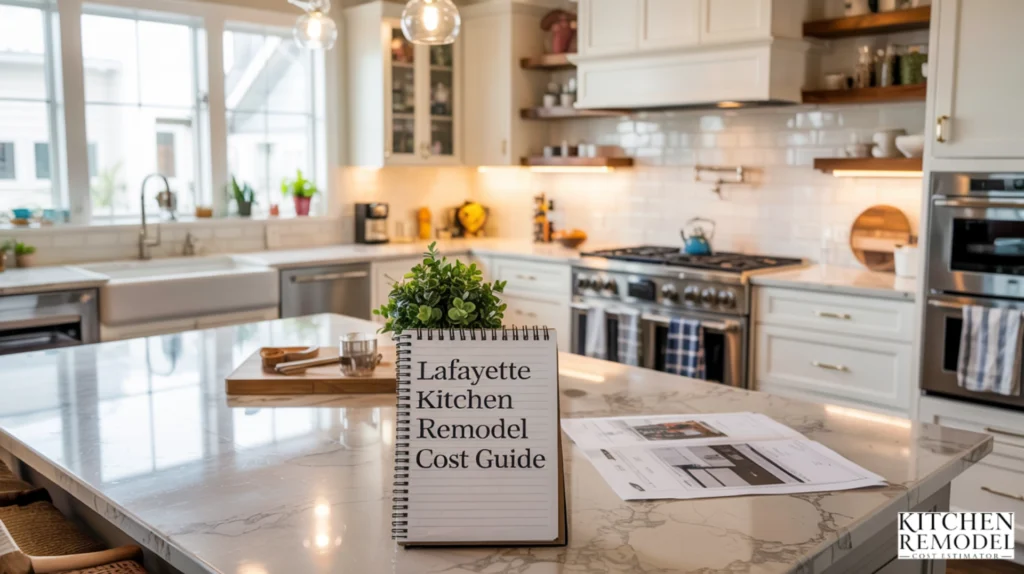
In Lafayette, where the foothills meet suburban comfort, kitchen remodels reflect both mountain practicality and Front Range aesthetics. The numbers tell a compelling story about how locals approach their culinary spaces—with costs varying dramatically based on vision, footprint, and material selections.
The entry point for Lafayette kitchen transformations starts with cosmetic refreshes ranging from $7,000 to $10,000. These modest updates focus on surface-level enhancements—think fresh paint, updated hardware, and potentially refaced cabinets—while keeping the original layout intact. Move up to mid-range renovations where most components get replaced but the footprint remains unchanged, and you’re looking at $11,000 to $25,000.
Kitchen configuration significantly impacts your bottom line. Galley designs, with their straightforward linear efficiency, typically run $5,000 to $25,000 depending on length and complexity. L-shaped kitchens occupying corner spaces around 100 square feet generally fall between $10,000 and $50,000, with larger versions trending toward the upper range. U-shaped or horseshoe kitchens require at least 175 square feet and command $17,500 to $75,000, reflecting their expanded cabinetry and countertop requirements.
The square-foot metric offers another useful planning lens. Lafayette homeowners typically invest between $100 and $250 per square foot, though basic refreshes might require as little as $75 per square foot. National projections for 2025 place the average kitchen renovation at $26,973, with a typical range of $14,592 to $41,537—but these figures only tell part of the Lafayette story.
Looking at the nearby Denver market provides more relevant context for our area. Denver kitchen remodels typically range from $190 to $375 per square foot—substantially higher than national averages. Lafayette costs likely align with these elevated figures, with some local variations. Size-specific estimates for our region include small kitchens (70-100 sq ft) at $13,300 to $37,500, medium spaces (100-200 sq ft) at $19,000 to $75,000, and larger kitchens (200+ sq ft) at $55,000 to $112,500 or more.
While one outlier source suggested Boulder renovations might reach $150,000 to $300,000, this appears to represent ultra-premium projects rather than typical local expenditures. More realistic national benchmarks show minor remodels around $27,500, major midrange renovations near $80,000, and upscale transformations exceeding $158,000—figures that generally align with Lafayette expectations when adjusted for our regional premium.
Breakdown of Remodel Costs
When Lafayette homeowners wonder where their renovation dollars actually go, the answer reveals both national patterns and local quirks. Understanding this distribution helps transform abstract budget numbers into tangible kitchen elements.
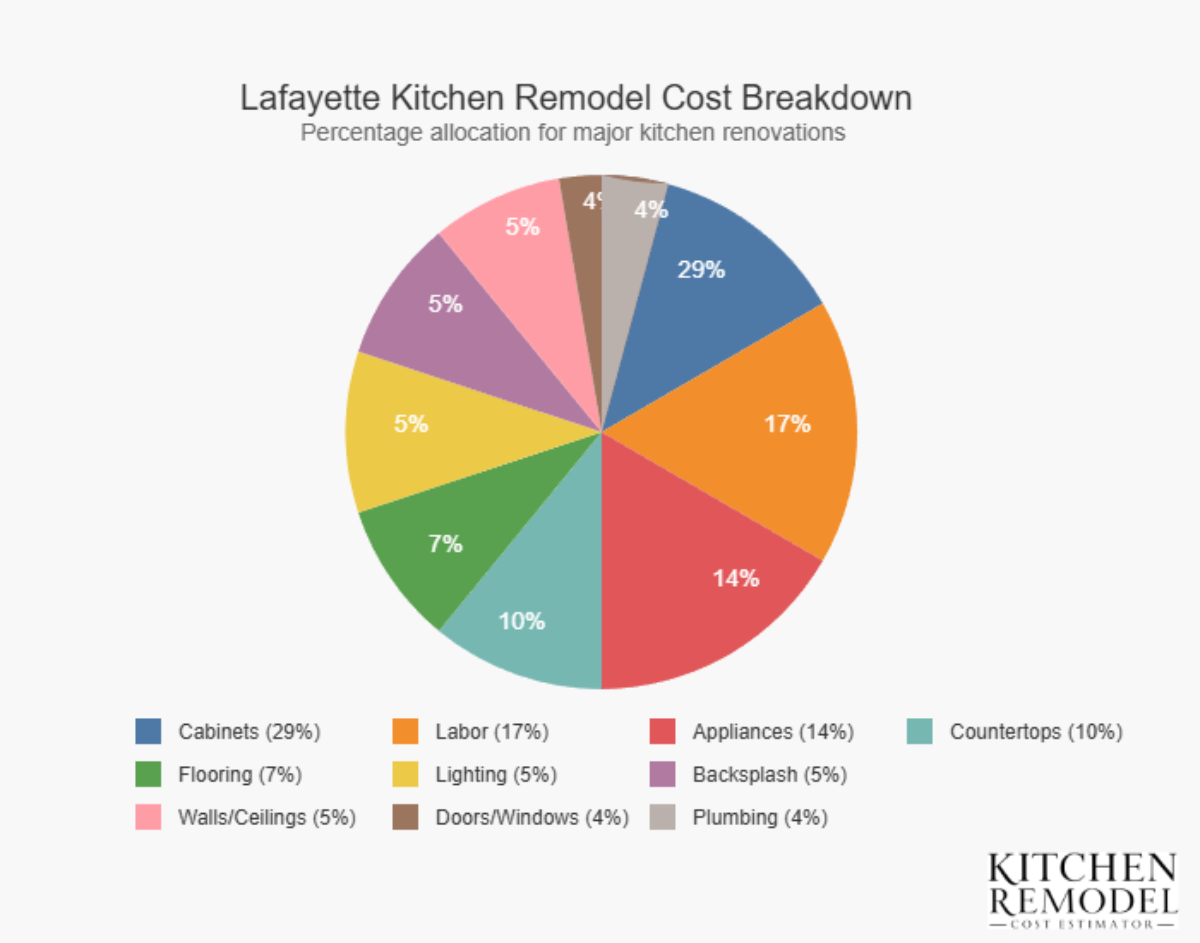
Cabinetry commands the lion’s share of most budgets—and with good reason. These functional foundations define both storage capacity and aesthetic direction. Stock cabinets offer value at $100 to $300 per linear foot, while custom options range from $500 to $1,200 per linear foot, reflecting their tailored craftsmanship and personalization potential.
Countertop selection represents another significant decision point, with dramatic price variations based on material choices. Colorado’s approximate per-square-foot pricing reveals the spectrum: laminate at $37 to $44 (practical and budget-friendly), granite at $86 to $96 (natural durability with unique patterns), quartz at $72 to $92 (engineered consistency with low maintenance), and marble at $117 to $133 (natural luxury with distinctive veining). Each option balances initial investment against longevity, maintenance requirements, and aesthetic impact.
Flooring installation adds another $1,000 to $4,000 to the equation, varying with kitchen size and material selection. Budget-conscious renovators might consider sheet vinyl, vinyl tile, linoleum, or laminate. Even seemingly minor elements contribute meaningfully—new faucets average around $260 installed, while sinks typically add about $420.
Examining percentage allocations offers another useful perspective. For basic kitchen refreshes in Denver, labor typically constitutes 45% of total costs, followed by cabinets (22%), appliances (11%), interior design (9%), countertops (7%), tile (4%), and miscellaneous components like sink, faucet, and paint (2%).
More comprehensive renovations show a different distribution: cabinets (29%), labor (17%), appliances (14%), countertops (10%), flooring (5%), lighting/electrical (5%), plumbing (6%), and backsplash (5%). This shift reflects how larger projects typically balance the budget differently across more substantial component upgrades.
Real-world examples bring these abstractions into focus. One DIY-focused Lafayette homeowner reported spending approximately $30,000, with the bulk allocated to cabinets, installation, countertops, and plumbing ($15,000) plus appliances ($10,000). Higher-end local projects often allocate $20,000 to $30,000 for cabinetry alone, with appliances around $30,000 and countertops approximately $20,000.
The scope naturally shapes these distributions. Minor refreshes might focus on cabinet refacing or entry-level replacements, while major overhauls typically incorporate semi-custom cabinetry and possibly kitchen islands. Premium renovations generally showcase custom cabinetry paired with natural stone surfaces—investment pieces that define the space for years to come.
Return on Investment (ROI)
For Lafayette homeowners debating kitchen renovation budgets, the return question looms large: “Will I get this money back when I sell?” The answer isn’t straightforward, but the numbers tell an illuminating story about our local market psychology.
graph TD
title["ROI by Kitchen Remodel Scale"]
subtitle["Lafayette/Denver vs. National Averages"]
title --> minor["Minor Remodel"]
title --> mid["Midrange Remodel"]
title --> major["Major/Upscale Remodel"]
minor --> minorLocal["Lafayette/Denver: 97.4%"]
minor --> minorNat["National: 72-81%"]
mid --> midLocal["Lafayette/Denver: 74.8%"]
mid --> midNat["National: 72%"]
major --> majorLocal["Lafayette/Denver: 38-75%"]
major --> majorNat["National: 38-58%"]
class minorLocal green
class midLocal lightgreen
class majorLocal orange
classDef green fill:#90EE90,stroke:#333,stroke-width:1px
classDef lightgreen fill:#C5E8B7,stroke:#333,stroke-width:1px
classDef orange fill:#FFCC99,stroke:#333,stroke-width:1pxThe financial return for kitchen renovations in the Denver metro area (including Lafayette) ranges from 38% to 96.1%—a dramatic spread that reflects the critical importance of project scope, material choices, and upgrade selections. This breadth poses an important question: what kind of renovation delivers the best bang for your buck in our specific market?
Minor kitchen refreshes in Denver yield a remarkable 97.4% average return—significantly outperforming most other home improvements and suggesting that modest, thoughtful updates resonate powerfully with Front Range buyers. This pattern makes intuitive sense for our practical Colorado market, where functionality and tasteful updates often trump extravagance.
Midrange renovations in Denver deliver a still-impressive 74.8% return. While these projects require greater initial investment (averaging around $80,000 locally), they substantially enhance both aesthetics and functionality, contributing meaningfully to resale appeal without crossing into diminishing returns territory.
National figures provide useful context: mid-range kitchen remodels average 72% ROI across the country, while minor updates typically recoup about 78%—both slightly lower than Denver’s robust returns. Larger national kitchen overhauls average around 59% ROI, with upscale renovations ranging from 52.5% to 71.2%.
The 2024 Cost vs. Value Report reinforces these patterns, showing a 96.1% return for minor kitchen remodels (midrange category), compared to 49.5% for major midrange renovations and just 38.0% for upscale transformations. This consistent pattern suggests a strategic approach for Lafayette homeowners considering both personal enjoyment and potential resale value.
Colorado as a whole typically sees kitchen renovations recovering between 57.4% and 62.1% during resale. Neighboring Boulder homeowners can anticipate recouping 54% to 71% of their kitchen investments—another relevant benchmark for our Front Range market.
What emerges from these figures isn’t just financial calculation but psychological insight: Lafayette buyers value updated kitchens but don’t necessarily pay proportionally more for ultra-premium materials and features. The sweet spot appears to be thoughtful, quality updates that prioritize function alongside tasteful aesthetics without pushing into luxury territory—a finding that aligns perfectly with our community’s practical, outdoors-oriented lifestyle.
Materials and Construction Standards
In Lafayette, where mountain climate meets suburban practicality, material selection and construction standards reflect both aesthetic preferences and environmental realities. These choices shape not just how your kitchen looks and functions, but how it weathers our unique conditions.
Cabinet costs reflect their fundamental importance to both storage and style. Lafayette homeowners typically find utility cabinets ranging from $500 to $3,000, corner cabinets from $180 to $1,000, base cabinets from $100 to $500, and wall cabinets from $100 to $300—with final pricing reflecting size, material quality, and customization level.
Countertop selections reveal similar variety, with Colorado’s average costs per square foot spanning from practical laminate ($37 to $44) to luxurious marble ($117 to $133), with granite ($86 to $96) and quartz ($72 to $92) occupying the popular middle ground. Flooring options provide another spectrum of choice, with national averages per square foot including ceramic tile ($4-$40), hardwood ($6-$22), natural stone ($6-$20), laminate ($3-$10), and vinyl ($3-$7).
Beyond aesthetics, Lafayette renovations must navigate specific regulatory requirements. All kitchen remodels must comply with the 2021 International Codes (I-Codes) and the 2023 National Electrical Code (NEC)—comprehensive regulations covering building, residential construction, fire safety, energy conservation, mechanical systems, fuel gas, plumbing, and more. These aren’t mere suggestions but mandatory standards for obtaining permits and ensuring structural integrity.
One particularly significant local requirement deserves special attention: Lafayette mandates all-electric systems for new residential construction, with limited exemptions for commercial projects. This regulation directly impacts appliance selection and electrical work scope—a perfect example of how local policy shapes renovation decisions.
Material choices in Lafayette typically include custom cabinetry, natural stone and engineered surfaces for countertops, and diverse flooring options including tile, hardwood, and luxury vinyl plank. Quartz countertops enjoy particular popularity for their durability and low maintenance requirements, often mimicking natural stone aesthetics without the associated care concerns.
Local companies like Wedgewood Cabinetry utilize locally sourced wood for custom cabinets—a thoughtful approach ensuring materials are properly acclimated to our regional climate fluctuations. Similarly, The Artisan Shop focuses on sustainable practices and responsible material sourcing, reflecting growing environmental consciousness among Lafayette homeowners.
For those prioritizing sustainability, options like bamboo, reclaimed wood, and recycled steel provide environmentally friendly alternatives. Energy-efficient appliances with ENERGY STAR ratings and water-efficient fixtures further support eco-conscious renovation goals while potentially reducing ongoing utility costs—a practical consideration in our resource-conscious Colorado community.
Labor Costs
The skilled hands transforming your Lafayette kitchen don’t come cheap—nor should they. Labor represents a substantial and often variable component of renovation budgets, typically accounting for 17% to 45% of total project costs depending on complexity and scope.
Interestingly, simpler refreshes often dedicate a higher percentage to labor, while more extensive renovations balance labor against premium materials and appliances. This shifting ratio reflects how material costs scale more dramatically than labor in higher-end projects.
Professional expertise comes at varying rates reflecting specialization, experience, and demand. General contractors typically charge $75 to $150+ hourly, carpenters $50 to $100+, electricians $75 to $120+, and plumbers $75 to $150+. Painters generally command $40 to $80+ hourly, while tile installers range from $50 to $100+ hourly (or charge per square foot for larger installations).
Cabinet installers typically fall into the $50 to $100+ hourly range, sometimes charging per linear foot instead. Interior designers, whose expertise shapes both aesthetics and functionality, generally charge $75 to $200+ hourly depending on experience and project scope.
On average, installation and labor represent approximately 17% of total renovation investment. For perspective, a $30,000 remodel might allocate roughly $5,100 to these skilled professionals. However, labor pricing varies significantly between companies based on operational structure, overhead costs, and market positioning.
Real-world examples illustrate this variability. One Lafayette homeowner reported an $80,000 total renovation with $45,000 for cabinets and $9,000 for countertops, leaving significant portions for labor, structural modifications, and remaining materials. Another local example suggested kitchen demolition and installation alone might range from $50,000 to $60,000, excluding appliances and certain materials—highlighting the substantial labor component in comprehensive renovations.
While one outlier report mentioned a $600 hourly quote for plumbing and electrical work in Lafayette, this appears dramatically higher than typical regional rates and merits skepticism without additional verification. More standard hourly rates for plumbers range from $75 to $150, with journeyman plumbers around $45 hourly and master plumbers commanding up to $200.
The take-home message for Lafayette homeowners? Labor costs reflect real expertise and significantly impact both budget and results. Obtaining multiple detailed quotes provides the clearest picture of current local rates—and remember that the lowest bid isn’t always the best value when considering quality, reliability, and long-term satisfaction.
Permitting Requirements
In the winding bureaucratic dance that is renovation permitting, Lafayette homeowners face specific steps that shape both timeline and budget. Understanding these requirements transforms potential frustration into manageable process.
Most kitchen remodels require permits—this isn’t optional territory. When budgeting, ensure your contractor includes permit costs in their estimate or allocate these funds separately. Lafayette operates on a valuation-based fee structure, with costs increasing proportionally to project size.
All Lafayette permit applications must comply with the 2021 International Codes and 2023 National Electrical Code. For residential remodels, submitted plans should remain modest in size—not exceeding 11 by 17 inches. The city specifically mandates permits for any alterations to electrical, gas, mechanical, or plumbing systems. Since most kitchen renovations modify at least one of these, permit requirements almost certainly apply.
Interestingly, Lafayette does allow homeowners to perform certain remodeling work on their primary residence without professional licensing—provided the home isn’t intended for sale or rental and the work is completed by the homeowner personally. All other scenarios require city-licensed contractors.
The permit fee calculation begins with project valuation. Lafayette’s Building Permit Fee Schedule starts at $30 for modest projects valued up to $500, then increases incrementally. Projects between $2,001 and $25,000 incur a fee of $80.25 for the first $2,000 plus $15.40 for each additional $1,000. Renovations valued between $25,001 and $50,000 cost $434.45 for the first $25,000 plus $11.11 per additional $1,000.
Beyond the base permit fee, expect a plan review fee equal to 65% of the building permit amount. Additional costs may include reinspection fees ($75 hourly) and supplemental plan review fees (also $75 hourly with a minimum half-hour charge). For particularly large projects where permit fees exceed $10,000, Lafayette requires payment via check or wire transfer rather than credit card.
Timing expectations vary widely, with the permitting process potentially taking anywhere from several days to multiple weeks depending on jurisdiction, complexity, and documentation quality. Required documentation typically includes personal information, property details, comprehensive project description (including structural, electrical, plumbing, and gas modifications), architectural plans, material list, estimated cost, and potentially contractor licensing proof.
While navigating permits might feel like an administrative burden, remember they serve a critical purpose—ensuring your renovation meets safety standards that protect both your family and future owners. Building this process into your timeline prevents the frustration of unexpected delays that can cascade into scheduling complications with contractors, material deliveries, and your overall project flow.
Design Trends and Preferences
In Lafayette, where mountain meets prairie and tradition mingles with innovation, kitchen design reflects both broader national currents and distinctive local sensibilities. Understanding these patterns helps homeowners create spaces that feel both contemporary and rooted in place.
Popular trends include bright color palettes that combat our occasional gray winter days, open-concept layouts that foster connection between cooking and living spaces, substantial kitchen islands that serve as family gathering points, and an overall emphasis on spacious, inviting atmospheres. Vibrant color schemes, natural material integration, thoughtfully chosen cabinet hues, and distinctive backsplashes frequently appear in recent local renovations.
The presence of European kitchen brands like Leicht in the Lafayette vicinity suggests appreciation for designs that balance precision craftsmanship with timeless aesthetics and functional efficiency. These kitchens typically feature clean lines, customizable elements, sustainable materials, and innovative storage solutions—often blending natural wood textures with minimalist high-gloss finishes for visual contrast.
A notable “Colorado Casual” style has emerged in local renovations, emphasizing natural elements with arts and crafts influences. This aesthetic bridges contemporary function with regional character—a perfect expression of Lafayette’s position between Boulder’s progressive design sensibilities and more traditional suburban approaches.
Local companies reflect and shape these preferences. Wedgewood Cabinetry offers extensive customization options, working with clients to manifest unique visions using preferred materials. German Kitchen Center provides sleek contemporary and classic styles with tailored layouts. Northbuilt Construction has observed growing popularity of specific features including coffee bars, panel-ready appliances, walk-in pantries, undercabinet lighting, and quartz countertops—elements that blend practical function with subtle luxury.
Stratton Construction, based in Lafayette, offers custom cabinets in various styles and materials alongside diverse countertop options (laminate, granite, marble, tile) and flooring selections, demonstrating the range of preferences among local homeowners. Meanwhile, The Artisan Shop specializes in custom cabinets with distinctive artisanal designs, emphasizing both quality craftsmanship and sustainable practices—a combination increasingly valued in our environmentally conscious community.
Whether you’re drawn to the natural warmth of Colorado Casual, the clean precision of European-inspired designs, or something that blends elements of multiple styles, Lafayette’s design community offers resources to realize your vision. The most successful local renovations typically balance contemporary function with thoughtful nods to our mountain-adjacent setting—creating kitchens that work beautifully while feeling authentically connected to place.
Material Availability
Lafayette homeowners enjoy a particularly advantageous position when sourcing renovation materials—benefiting from both national retail accessibility and distinctive local craftsmanship. This combination offers both convenience and character for kitchen transformations.
National home improvement retailers like Home Depot maintain multiple locations surrounding Lafayette, including nearby Louisville, Broomfield, North Thornton, and Boulder. These provide ready access to standard kitchen components including cabinets, countertops, appliances, flooring, and hardware—often with competitive pricing and immediate availability for common items.
What truly distinguishes Lafayette, however, is its thriving ecosystem of specialized local businesses. Wedgewood Cabinetry crafts custom kitchen cabinets using locally sourced wood already acclimated to our regional climate fluctuations—an important consideration given Colorado’s dramatic seasonal shifts. Beyond their custom offerings, they feature several semi-custom cabinetry lines, providing varied style and price options.
The Artisan Shop focuses on in-house manufacturing of custom cabinets with distinctive artisanal touches, emphasizing both craftsmanship quality and sustainable practices. For homeowners seeking unique or budget-friendly alternatives, Ben’s Repurposed Cabinetry in nearby Loveland offers rescued and repurposed kitchen cabinets—an environmentally conscious option that often provides character impossible to find in new construction.
General contractors based in Lafayette, including Northbuilt Construction and Stratton Construction, offer comprehensive renovation services with established supplier relationships that can simplify material coordination. Those interested in premium European designs can explore German Kitchen Center’s offerings, which serve the Lafayette area with distinctive continental aesthetics.
For appliances, regional retailers like Appliances4LessNoco.com and Mountain High Appliance provide specialized selection and expertise beyond typical big-box options. Interestingly, even JAX Lafayette Farm & Ranch has received recognition for kitchen supply offerings in the past, though current inventory would require verification.
This diverse material landscape provides Lafayette homeowners with remarkable flexibility. Those prioritizing convenience and budget predictability can rely on national retailers, while those seeking distinctive character, local craftsmanship, or sustainable options can tap into our rich community of specialized providers. The most successful renovations often blend elements from both worlds—perhaps stock flooring paired with locally crafted cabinetry, or standard appliances installed within custom configurations.
Conclusions
Lafayette kitchen renovations mirror our community—practical yet design-conscious, mountain-influenced yet distinctly suburban. While costs range dramatically, Denver’s $190-$375 per square foot benchmark offers the clearest local perspective.
The financial wisdom is clear: modest updates consistently outperform comprehensive overhauls in return on investment. This pattern perfectly aligns with Lafayette’s sensible approach to home enhancement.
Regulatory requirements create clear boundaries, with the 2021 International Codes and mandatory all-electric systems in new construction shaping both planning and execution. Meanwhile, design preferences blend national trends with regional character—appreciating natural materials while exploring contemporary European influences.
For homeowners contemplating their own culinary transformation, Lafayette offers the perfect storm of resources: regulatory clarity, material accessibility, skilled craftspeople, and design expertise. The most successful projects balance aspiration with pragmatism—creating spaces that elevate both daily living and property value without unnecessary extravagance.
In essence, the perfect Lafayette kitchen reflects the community itself: appreciative of quality and beauty, yet fundamentally grounded in practical mountain-adjacent living.
FAQ
How much does it cost to remodel a kitchen in Colorado?
The cost to remodel a kitchen in Colorado typically ranges from $15,000 to $50,000, depending on the size and scope of the project. Smaller renovations may cost closer to $15,000, while high-end remodels with custom features can exceed $50,000. Factors like materials, labor, and location significantly influence the overall cost.
What is a reasonable budget for a kitchen remodel?
A reasonable budget for a kitchen remodel is 5-15% of your home’s value. For example, if your home is worth $300,000, a budget between $15,000 and $45,000 is appropriate. This ensures you balance quality improvements without overspending relative to your home’s value.
Is $10,000 enough for a kitchen remodel?
A $10,000 budget is sufficient for a minor kitchen remodel. This may cover painting, updating hardware, replacing lighting fixtures, and installing new countertops or appliances. However, it is unlikely to cover extensive changes like custom cabinetry or structural modifications.
How much should a 12×12 kitchen remodel cost?
A 12×12 kitchen remodel typically costs between $20,000 and $40,000. The price depends on factors such as materials, labor, and the extent of upgrades like cabinetry, flooring, and appliances. High-end finishes or custom work can push the cost higher.

